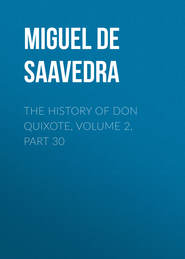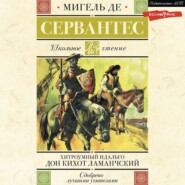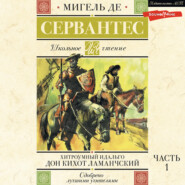По всем вопросам обращайтесь на: info@litportal.ru
(©) 2003-2024.
✖
Don Quixote
Настройки чтения
Размер шрифта
Высота строк
Поля
Let worthy Sancho go in peace, and good luck to him, Gentle Reader; and look out for two bushels of laughter, which the account of how he behaved himself in office will give thee. In the meantime turn thy attention to what happened his master the same night, and if thou dost not laugh thereat, at any rate thou wilt stretch thy mouth with a grin; for Don Quixote's adventures must be honoured either with wonder or with laughter.
It is recorded, then, that as soon as Sancho had gone, Don Quixote felt his loneliness, and had it been possible for him to revoke the mandate and take away the government from him he would have done so. The duchess observed his dejection and asked him why he was melancholy; because, she said, if it was for the loss of Sancho, there were squires, duennas, and damsels in her house who would wait upon him to his full satisfaction.
"The truth is, senora," replied Don Quixote, "that I do feel the loss of Sancho; but that is not the main cause of my looking sad; and of all the offers your excellence makes me, I accept only the good-will with which they are made, and as to the remainder I entreat of your excellence to permit and allow me alone to wait upon myself in my chamber."
"Indeed, Senor Don Quixote," said the duchess, "that must not be; four of my damsels, as beautiful as flowers, shall wait upon you."
"To me," said Don Quixote, "they will not be flowers, but thorns to pierce my heart. They, or anything like them, shall as soon enter my chamber as fly. If your highness wishes to gratify me still further, though I deserve it not, permit me to please myself, and wait upon myself in my own room; for I place a barrier between my inclinations and my virtue, and I do not wish to break this rule through the generosity your highness is disposed to display towards me; and, in short, I will sleep in my clothes, sooner than allow anyone to undress me."
"Say no more, Senor Don Quixote, say no more," said the duchess; "I assure you I will give orders that not even a fly, not to say a damsel, shall enter your room. I am not the one to undermine the propriety of Senor Don Quixote, for it strikes me that among his many virtues the one that is pre-eminent is that of modesty. Your worship may undress and dress in private and in your own way, as you please and when you please, for there will be no one to hinder you; and in your chamber you will find all the utensils requisite to supply the wants of one who sleeps with his door locked, to the end that no natural needs compel you to open it. May the great Dulcinea del Toboso live a thousand years, and may her fame extend all over the surface of the globe, for she deserves to be loved by a knight so valiant and so virtuous; and may kind heaven infuse zeal into the heart of our governor Sancho Panza to finish off his discipline speedily, so that the world may once more enjoy the beauty of so grand a lady."
To which Don Quixote replied, "Your highness has spoken like what you are; from the mouth of a noble lady nothing bad can come; and Dulcinea will be more fortunate, and better known to the world by the praise of your highness than by all the eulogies the greatest orators on earth could bestow upon her."
"Well, well, Senor Don Quixote," said the duchess, it is nearly supper-time, and the duke is probably waiting; come let us go to supper, and retire to rest early, for the journey you made yesterday from Kandy was not such a short one but that it must have caused you some fatigue."
"I feel none, senora," said Don Quixote, "for I would go so far as to swear to your excellence that in all my life I never mounted a quieter beast, or a pleasanter paced one, than Clavileno; and I don't know what could have induced Malambruno to discard a steed so swift and so gentle, and burn it so recklessly as he did."
"Probably," said the duchess, "repenting of the evil he had done to the Trifaldi and company, and others, and the crimes he must have committed as a wizard and enchanter, he resolved to make away with all the instruments of his craft; and so burned Clavileno as the chief one, and that which mainly kept him restless, wandering from land to land; and by its ashes and the trophy of the placard the valour of the great Don Quixote of La Mancha is established for ever."
Don Quixote renewed his thanks to the duchess; and having supped, retired to his chamber alone, refusing to allow anyone to enter with him to wait on him, such was his fear of encountering temptations that might lead or drive him to forget his chaste fidelity to his lady Dulcinea; for he had always present to his mind the virtue of Amadis, that flower and mirror of knights-errant. He locked the door behind him, and by the light of two wax candles undressed himself, but as he was taking off his stockings – O disaster unworthy of such a personage! – there came a burst, not of sighs, or anything belying his delicacy or good breeding, but of some two dozen stitches in one of his stockings, that made it look like a window-lattice. The worthy gentleman was beyond measure distressed, and at that moment he would have given an ounce of silver to have had half a drachm of green silk there; I say green silk, because the stockings were green.
Here Cide Hamete exclaimed as he was writing, "O poverty, poverty! I know not what could have possessed the great Cordovan poet to call thee 'holy gift ungratefully received.' Although a Moor, I know well enough from the intercourse I have had with Christians that holiness consists in charity, humility, faith, obedience, and poverty; but for all that, I say he must have a great deal of godliness who can find any satisfaction in being poor; unless, indeed, it be the kind of poverty one of their greatest saints refers to, saying, 'possess all things as though ye possessed them not;' which is what they call poverty in spirit. But thou, that other poverty – for it is of thee I am speaking now – why dost thou love to fall out with gentlemen and men of good birth more than with other people? Why dost thou compel them to smear the cracks in their shoes, and to have the buttons of their coats, one silk, another hair, and another glass? Why must their ruffs be always crinkled like endive leaves, and not crimped with a crimping iron?" (From this we may perceive the antiquity of starch and crimped ruffs.) Then he goes on: "Poor gentleman of good family! always cockering up his honour, dining miserably and in secret, and making a hypocrite of the toothpick with which he sallies out into the street after eating nothing to oblige him to use it! Poor fellow, I say, with his nervous honour, fancying they perceive a league off the patch on his shoe, the sweat-stains on his hat, the shabbiness of his cloak, and the hunger of his stomach!"
All this was brought home to Don Quixote by the bursting of his stitches; however, he comforted himself on perceiving that Sancho had left behind a pair of travelling boots, which he resolved to wear the next day. At last he went to bed, out of spirits and heavy at heart, as much because he missed Sancho as because of the irreparable disaster to his stockings, the stitches of which he would have even taken up with silk of another colour, which is one of the greatest signs of poverty a gentleman can show in the course of his never-failing embarrassments. He put out the candles; but the night was warm and he could not sleep; he rose from his bed and opened slightly a grated window that looked out on a beautiful garden, and as he did so he perceived and heard people walking and talking in the garden. He set himself to listen attentively, and those below raised their voices so that he could hear these words:
"Urge me not to sing, Emerencia, for thou knowest that ever since this stranger entered the castle and my eyes beheld him, I cannot sing but only weep; besides my lady is a light rather than a heavy sleeper, and I would not for all the wealth of the world that she found us here; and even if she were asleep and did not waken, my singing would be in vain, if this strange AEneas, who has come into my neighbourhood to flout me, sleeps on and wakens not to hear it."
"Heed not that, dear Altisidora," replied a voice; "the duchess is no doubt asleep, and everybody in the house save the lord of thy heart and disturber of thy soul; for just now I perceived him open the grated window of his chamber, so he must be awake; sing, my poor sufferer, in a low sweet tone to the accompaniment of thy harp; and even if the duchess hears us we can lay the blame on the heat of the night."
"That is not the point, Emerencia," replied Altisidora, "it is that I would not that my singing should lay bare my heart, and that I should be thought a light and wanton maiden by those who know not the mighty power of love; but come what may; better a blush on the cheeks than a sore in the heart;" and here a harp softly touched made itself heard. As he listened to all this Don Quixote was in a state of breathless amazement, for immediately the countless adventures like this, with windows, gratings, gardens, serenades, lovemakings, and languishings, that he had read of in his trashy books of chivalry, came to his mind. He at once concluded that some damsel of the duchess's was in love with him, and that her modesty forced her to keep her passion secret. He trembled lest he should fall, and made an inward resolution not to yield; and commending himself with all his might and soul to his lady Dulcinea he made up his mind to listen to the music; and to let them know he was there he gave a pretended sneeze, at which the damsels were not a little delighted, for all they wanted was that Don Quixote should hear them. So having tuned the harp, Altisidora, running her hand across the strings, began this ballad:
O thou that art above in bed,
Between the holland sheets,
A-lying there from night till morn,
With outstretched legs asleep;
O thou, most valiant knight of all
The famed Manchegan breed,
Of purity and virtue more
Than gold of Araby;
Give ear unto a suffering maid,
Well-grown but evil-starr'd,
For those two suns of thine have lit
A fire within her heart.
Adventures seeking thou dost rove,
To others bringing woe;
Thou scatterest wounds, but, ah, the balm
To heal them dost withhold!
Say, valiant youth, and so may God
Thy enterprises speed,
Didst thou the light mid Libya's sands
Or Jaca's rocks first see?
Did scaly serpents give thee suck?
Who nursed thee when a babe?
Wert cradled in the forest rude,
Or gloomy mountain cave?
O Dulcinea may be proud,
That plump and lusty maid;
For she alone hath had the power
A tiger fierce to tame.
And she for this shall famous be
From Tagus to Jarama,
From Manzanares to Genil,
From Duero to Arlanza.
Fain would I change with her, and give
A petticoat to boot,
The best and bravest that I have,
All trimmed with gold galloon.
O for to be the happy fair
Thy mighty arms enfold,
Or even sit beside thy bed
And scratch thy dusty poll!
I rave, – to favours such as these
Unworthy to aspire;
Thy feet to tickle were enough
For one so mean as I.
What caps, what slippers silver-laced,
Would I on thee bestow!
What damask breeches make for thee;
What fine long holland cloaks!
And I would give thee pearls that should
As big as oak-galls show;
So matchless big that each might well
Be called the great "Alone."
Manchegan Nero, look not down
From thy Tarpeian Rock
Upon this burning heart, nor add
It is recorded, then, that as soon as Sancho had gone, Don Quixote felt his loneliness, and had it been possible for him to revoke the mandate and take away the government from him he would have done so. The duchess observed his dejection and asked him why he was melancholy; because, she said, if it was for the loss of Sancho, there were squires, duennas, and damsels in her house who would wait upon him to his full satisfaction.
"The truth is, senora," replied Don Quixote, "that I do feel the loss of Sancho; but that is not the main cause of my looking sad; and of all the offers your excellence makes me, I accept only the good-will with which they are made, and as to the remainder I entreat of your excellence to permit and allow me alone to wait upon myself in my chamber."
"Indeed, Senor Don Quixote," said the duchess, "that must not be; four of my damsels, as beautiful as flowers, shall wait upon you."
"To me," said Don Quixote, "they will not be flowers, but thorns to pierce my heart. They, or anything like them, shall as soon enter my chamber as fly. If your highness wishes to gratify me still further, though I deserve it not, permit me to please myself, and wait upon myself in my own room; for I place a barrier between my inclinations and my virtue, and I do not wish to break this rule through the generosity your highness is disposed to display towards me; and, in short, I will sleep in my clothes, sooner than allow anyone to undress me."
"Say no more, Senor Don Quixote, say no more," said the duchess; "I assure you I will give orders that not even a fly, not to say a damsel, shall enter your room. I am not the one to undermine the propriety of Senor Don Quixote, for it strikes me that among his many virtues the one that is pre-eminent is that of modesty. Your worship may undress and dress in private and in your own way, as you please and when you please, for there will be no one to hinder you; and in your chamber you will find all the utensils requisite to supply the wants of one who sleeps with his door locked, to the end that no natural needs compel you to open it. May the great Dulcinea del Toboso live a thousand years, and may her fame extend all over the surface of the globe, for she deserves to be loved by a knight so valiant and so virtuous; and may kind heaven infuse zeal into the heart of our governor Sancho Panza to finish off his discipline speedily, so that the world may once more enjoy the beauty of so grand a lady."
To which Don Quixote replied, "Your highness has spoken like what you are; from the mouth of a noble lady nothing bad can come; and Dulcinea will be more fortunate, and better known to the world by the praise of your highness than by all the eulogies the greatest orators on earth could bestow upon her."
"Well, well, Senor Don Quixote," said the duchess, it is nearly supper-time, and the duke is probably waiting; come let us go to supper, and retire to rest early, for the journey you made yesterday from Kandy was not such a short one but that it must have caused you some fatigue."
"I feel none, senora," said Don Quixote, "for I would go so far as to swear to your excellence that in all my life I never mounted a quieter beast, or a pleasanter paced one, than Clavileno; and I don't know what could have induced Malambruno to discard a steed so swift and so gentle, and burn it so recklessly as he did."
"Probably," said the duchess, "repenting of the evil he had done to the Trifaldi and company, and others, and the crimes he must have committed as a wizard and enchanter, he resolved to make away with all the instruments of his craft; and so burned Clavileno as the chief one, and that which mainly kept him restless, wandering from land to land; and by its ashes and the trophy of the placard the valour of the great Don Quixote of La Mancha is established for ever."
Don Quixote renewed his thanks to the duchess; and having supped, retired to his chamber alone, refusing to allow anyone to enter with him to wait on him, such was his fear of encountering temptations that might lead or drive him to forget his chaste fidelity to his lady Dulcinea; for he had always present to his mind the virtue of Amadis, that flower and mirror of knights-errant. He locked the door behind him, and by the light of two wax candles undressed himself, but as he was taking off his stockings – O disaster unworthy of such a personage! – there came a burst, not of sighs, or anything belying his delicacy or good breeding, but of some two dozen stitches in one of his stockings, that made it look like a window-lattice. The worthy gentleman was beyond measure distressed, and at that moment he would have given an ounce of silver to have had half a drachm of green silk there; I say green silk, because the stockings were green.
Here Cide Hamete exclaimed as he was writing, "O poverty, poverty! I know not what could have possessed the great Cordovan poet to call thee 'holy gift ungratefully received.' Although a Moor, I know well enough from the intercourse I have had with Christians that holiness consists in charity, humility, faith, obedience, and poverty; but for all that, I say he must have a great deal of godliness who can find any satisfaction in being poor; unless, indeed, it be the kind of poverty one of their greatest saints refers to, saying, 'possess all things as though ye possessed them not;' which is what they call poverty in spirit. But thou, that other poverty – for it is of thee I am speaking now – why dost thou love to fall out with gentlemen and men of good birth more than with other people? Why dost thou compel them to smear the cracks in their shoes, and to have the buttons of their coats, one silk, another hair, and another glass? Why must their ruffs be always crinkled like endive leaves, and not crimped with a crimping iron?" (From this we may perceive the antiquity of starch and crimped ruffs.) Then he goes on: "Poor gentleman of good family! always cockering up his honour, dining miserably and in secret, and making a hypocrite of the toothpick with which he sallies out into the street after eating nothing to oblige him to use it! Poor fellow, I say, with his nervous honour, fancying they perceive a league off the patch on his shoe, the sweat-stains on his hat, the shabbiness of his cloak, and the hunger of his stomach!"
All this was brought home to Don Quixote by the bursting of his stitches; however, he comforted himself on perceiving that Sancho had left behind a pair of travelling boots, which he resolved to wear the next day. At last he went to bed, out of spirits and heavy at heart, as much because he missed Sancho as because of the irreparable disaster to his stockings, the stitches of which he would have even taken up with silk of another colour, which is one of the greatest signs of poverty a gentleman can show in the course of his never-failing embarrassments. He put out the candles; but the night was warm and he could not sleep; he rose from his bed and opened slightly a grated window that looked out on a beautiful garden, and as he did so he perceived and heard people walking and talking in the garden. He set himself to listen attentively, and those below raised their voices so that he could hear these words:
"Urge me not to sing, Emerencia, for thou knowest that ever since this stranger entered the castle and my eyes beheld him, I cannot sing but only weep; besides my lady is a light rather than a heavy sleeper, and I would not for all the wealth of the world that she found us here; and even if she were asleep and did not waken, my singing would be in vain, if this strange AEneas, who has come into my neighbourhood to flout me, sleeps on and wakens not to hear it."
"Heed not that, dear Altisidora," replied a voice; "the duchess is no doubt asleep, and everybody in the house save the lord of thy heart and disturber of thy soul; for just now I perceived him open the grated window of his chamber, so he must be awake; sing, my poor sufferer, in a low sweet tone to the accompaniment of thy harp; and even if the duchess hears us we can lay the blame on the heat of the night."
"That is not the point, Emerencia," replied Altisidora, "it is that I would not that my singing should lay bare my heart, and that I should be thought a light and wanton maiden by those who know not the mighty power of love; but come what may; better a blush on the cheeks than a sore in the heart;" and here a harp softly touched made itself heard. As he listened to all this Don Quixote was in a state of breathless amazement, for immediately the countless adventures like this, with windows, gratings, gardens, serenades, lovemakings, and languishings, that he had read of in his trashy books of chivalry, came to his mind. He at once concluded that some damsel of the duchess's was in love with him, and that her modesty forced her to keep her passion secret. He trembled lest he should fall, and made an inward resolution not to yield; and commending himself with all his might and soul to his lady Dulcinea he made up his mind to listen to the music; and to let them know he was there he gave a pretended sneeze, at which the damsels were not a little delighted, for all they wanted was that Don Quixote should hear them. So having tuned the harp, Altisidora, running her hand across the strings, began this ballad:
O thou that art above in bed,
Between the holland sheets,
A-lying there from night till morn,
With outstretched legs asleep;
O thou, most valiant knight of all
The famed Manchegan breed,
Of purity and virtue more
Than gold of Araby;
Give ear unto a suffering maid,
Well-grown but evil-starr'd,
For those two suns of thine have lit
A fire within her heart.
Adventures seeking thou dost rove,
To others bringing woe;
Thou scatterest wounds, but, ah, the balm
To heal them dost withhold!
Say, valiant youth, and so may God
Thy enterprises speed,
Didst thou the light mid Libya's sands
Or Jaca's rocks first see?
Did scaly serpents give thee suck?
Who nursed thee when a babe?
Wert cradled in the forest rude,
Or gloomy mountain cave?
O Dulcinea may be proud,
That plump and lusty maid;
For she alone hath had the power
A tiger fierce to tame.
And she for this shall famous be
From Tagus to Jarama,
From Manzanares to Genil,
From Duero to Arlanza.
Fain would I change with her, and give
A petticoat to boot,
The best and bravest that I have,
All trimmed with gold galloon.
O for to be the happy fair
Thy mighty arms enfold,
Or even sit beside thy bed
And scratch thy dusty poll!
I rave, – to favours such as these
Unworthy to aspire;
Thy feet to tickle were enough
For one so mean as I.
What caps, what slippers silver-laced,
Would I on thee bestow!
What damask breeches make for thee;
What fine long holland cloaks!
And I would give thee pearls that should
As big as oak-galls show;
So matchless big that each might well
Be called the great "Alone."
Manchegan Nero, look not down
From thy Tarpeian Rock
Upon this burning heart, nor add

















